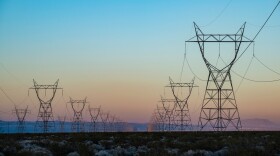-
A coalition of public lands advocates and historians has filed a federal lawsuit against the Trump administration, accusing it of censoring American history and science at national parks, including several in the Mountain West.
-
More than a century after the Mountain West’s silver and gold rushes, mercury used to process those metals is still moving through a northern Nevada river system and showing up in local wildlife.
-
The power grid across Western states is under growing strain. Now, a new report argues the region’s governments and utilities need to work together to keep the lights on and costs down.
-
A new report from climate central shows that extremely warm winter days are on the rise.
-
Electric vehicles are becoming more common across the country. But in the Mountain West, long distances, rural roads and wide-open spaces can make switching to electric more challenging.
-
Across the Mountain West, where drought and shrinking reservoirs are putting pressure on already limited water supplies, decisions about who uses how much water often hinge on imperfect data. A nonprofit collaboration called OpenET hopes to change that.
-
National monuments across the West do more than preserve iconic landscapes — they also help protect the rivers millions of people rely on for drinking water. But a new analysis warns those protections could weaken under the Trump administration’s push to redraw the boundaries of several monuments.
-
New research shows that mountain regions around the world are warming faster than the lowlands below them. Scientists say that could have big consequences for the Mountain West, where communities rely on snow and ice for their water supply.
-
New research shows that many rural roads in the Mountain West may be more vulnerable to flooding than people realize. That’s because the culverts and stream crossings underneath them aren’t built to handle today’s storms.
-
A new study in the Rocky Mountains has found a steep drop in the number of young American pikas — small, high-altitude mammals known for their distinctive squeaks and rock-pile homes. Researchers say the 50% decline could be an early sign of deeper ecological shifts as the climate warms.

Play Live Radio
Next Up:
0:00
0:00
Available On Air Stations










